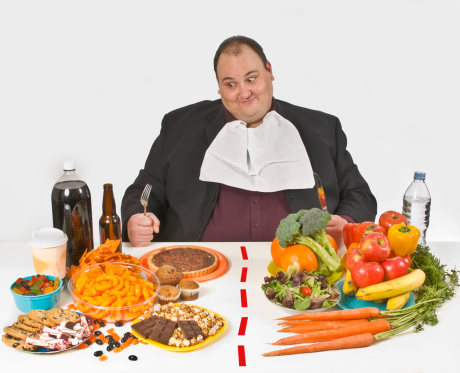Stay Informed
Popular Articles
- Hiatal Hernia: Hidden Cause of Chronic Illness
- Small Intestinal Bacterial Overgrowth (SIBO)
- Applied Lymphology: Unlocking the Secret to Pain Relief
- An Introduction to Constitutional Iridology
- The Low Down on Liver Detoxification
- An Energetic and Emotional Approach to Cancer
- Fat Facts
- Marrow in the Bones
- Blood Type and Nutrition
- Cardiac Herbs: Beyond Hawthorn
Quick Search
The School of Modern Herbal Medicine




Developing a Healthier Relationship with Food
- 6/20/2009
- Categorized in: Nutrition
This is part one of a three part article.
The other parts are:
Part Two: A Sure-Fire Approach to Getting Fat (what not to do)
Part Three: Eating for Health and Longevity (what to do)
Have you ever been overweight? Odds are pretty good that you are right now. I am and so is about 70% of the American population. I don't consider myself seriously overweight, and I'm doing better than I was a couple of years ago, but I'd still like to lose some more weight.
I haven't always had these extra pounds of body fat. At one time, I was actually underweight (yes, it is possible to be too skinny—which isn't healthy either). At times I've gained a few pounds, but then, it always seemed to come off on its own without me having to think about it much. This is the first time that didn't happen and I've had to consciously figure out how to take the pounds off.
I'm going to be very blunt here, because from what I've observed in myself and others, weight is about 50% emotional and 50% physical. One thing that's very clear to me is that when I'm happy and not feeling stressed, I always lose weight. When I'm unhappy and feeling stressed, I always gain weight. Part of this is that when I'm happy and feeling good, I'm more physically active and I eat less compulsively.
That's why I don't believe the “diet and exercise” mantra. I've been close to several people who have very serious weight problems and these people often eat less than I do and still don't lose weight. I've also observed that trying to make yourself eat less, puts you in a constant battle of willpower trying to deny your cravings and appetite. When you pit mind against body, the body just about always wins. This is amply evidenced by the fact that 90% of all people who lose weight by dieting and exercising gain back all the weight they lost (and sometimes even more than they lost).
So, what is really going on here?
It's Not Just Calories and Exercise
 No one in their right mind can deny that when you consume more food than your body burns for energy that the body will store the excess energy as fat. That's an obvious fact. And, no one can also deny that if you increase energy consumption (activity), while decreasing food intake that the body can burn stored fat, will cause you to lose weight. (Starve yourself long enough and you'll get downright skinny.)
No one in their right mind can deny that when you consume more food than your body burns for energy that the body will store the excess energy as fat. That's an obvious fact. And, no one can also deny that if you increase energy consumption (activity), while decreasing food intake that the body can burn stored fat, will cause you to lose weight. (Starve yourself long enough and you'll get downright skinny.)
However, the big question is, “Why are we eating too much food?” It isn't natural. The feedback from the body should tell us when we've eaten enough food and shut down our appetite. How come this isn't happening?
For instance, consider thirst. When there isn't enough water in the system, it trips a thirst mechanism, which causes you to seek out water. The volume of water in the blood trips the thirst mechanism on, but if you had to wait until the blood level of water normalized before thirst tripped off, you'd drink too much water, because of the time it takes for water to be absorbed into the bloodstream. So, the thirst mechanism is turned off by swallowing, and the body can gauge within a few ounces whether you've swallowed the right amount of water to properly rehydrate the blood.
Why shouldn't our appetite mechanism be just as sensitive? I believe it is. The body knows how many “calories” of energy it needs and what nutrients it lacks and can adjust our sense of taste, smell and appetite to regulate our food consumption accordingly. Try this as an experiment some time. Get some apples and start eating them. Try to force yourself to eat too many apples. I bet you won't be able to do it. You'll get to the point where your body will rebel to the point you won't be able to gag down another bite of apple. Don't believe me? Try it, then you'll know what I'm talking about.
So, the fact that we're eating more calories than we need shows there is some kind of breakdown in the communication system between the mind and the body. If we can fix this communication breakdown, we'll not only lose weight easily and naturally but keep it off too. It won't require willpower because we won't be trying to control the body via our conscious mind. Instead, it will be easy to do because mind and body will be in harmony.
So, how do we fix this communication breakdown? I believe that there are two primary reasons for this lack of mind-body communication. The first is what we are eating and the second is how happy we are (which includes how we eat what we eat).
Nutritional Density and Empty Calories
 It is very clear to anyone who looks closely at the situation that refined and processed foods are the number one reason for the increase in serious weight problems in our culture. The reason that refined and processed foods contribute to weight gain is that the body doesn't just need calories. It also needs vitamins, minerals, enzymes and numerous phytochemicals whose nutritional value has yet to be established. All of these nutrients (both recognized and unrecognized) are present in whole, natural foods.
It is very clear to anyone who looks closely at the situation that refined and processed foods are the number one reason for the increase in serious weight problems in our culture. The reason that refined and processed foods contribute to weight gain is that the body doesn't just need calories. It also needs vitamins, minerals, enzymes and numerous phytochemicals whose nutritional value has yet to be established. All of these nutrients (both recognized and unrecognized) are present in whole, natural foods.
Most diet programs and books focus only on calories or the source of those calories. Calories come from fats, proteins and carbohydrates. Most diets focus on trying to modify caloric intake and/or to adjust the source of those calories (i.e., low fat, low carb, high protein, low glycemic, etc.) The assumption is that all we need to do is adjust the caloric intake and the rest of what the body needs will automatically be present in the diet. I don't believe this is accurate.
It is no secret that my favorite research on nutrition was conducted by Dr. Weston Price, a dentist who toured the world in the 1930's studying traditional diets and the health of traditional people. Dr. Price found that traditional people seldom got sick, had excellent bones and teeth and tended to be socially well adjusted. In testing their food, he found that it was more nutritionally dense than the food being consumed by their “civilized” counterparts. For example, he found that traditional diets contained four times more water soluble vitamins and ten times more fat soluble vitamins than the foods most Americans were eating at that time.
If our diets were that deficient, compared to traditional diets, in the 1930s, think how much worse the situation is today. The bottom line is that our commercial sources of food, even natural foods like fresh fruits and vegetables, are generally lacking in vitamins, minerals and other phytonutrients. This is largely due to modern agricultural practices which are not taking proper care of the soil.
This is bad enough, but when we take already nutritionally depleted foods and then refine and process them, we further deplete vitamin and mineral content. The result is an even lower nutritional density. Refined flour, white rice, processed oils, refined sugars, canned goods, packaged foods, etc. have all been stripped of their complex nutritive value, making them “empty calorie” foods. Modern food manufacturers like these processed “foods” because they can be stored almost indefinitely. So, they fight to keep people from recognizing the truth about the dangers of these foods to our health.
Armed with this knowledge, those of us “in the know” go looking for better food. Knowing that “organically-grown” food is likely to have more nutritional density, we buy organic. But, even in the “health food store,” we encounter some “empty calorie” foods. A lot of the bread is made with “organic, unbleached white flour” and we find “organic refined sugar” in many “health foods,” too. If you're going to grow something organically (and therefore try to increase it's nutritional value) why would you want to refine it and strip its nutritional value away?
The Challenge of Finding Quality Food

So, finding good quality food can be a challenge in modern society. As a result, the body isn't getting all the nutrients it needs in the foods we eat, so our appetite isn't satisfied even though we've consumed enough calories for energy. For example, one might eat four slices of white sandwich bread (even if it is unbleached and organic) and still feel unsatisfied, while one slice of a dense, whole grain bread might leave one feeling full. The calorie content of a slice of whole grain bread is about the same as that of a slice of white bread, but the fiber, minerals and other nutrients in the whole grains make them more filling. They also lower the glycemic load of the food (that is, how much insulin production it triggers).
This is why I can't understand why most of the diet books and programs completely ignore the issue of food quality. If you lower your caloric intake of empty calorie foods, you're only going to make that nutrient depletion worse, leaving you even hungrier than you were before. No wonder people can't lose weight. The 1.5 trillion dollar processed food industry has gotten the majority of Americans so “duped” that they can't see that they're all addicted to junk food.
Unfortunately, taking a vitamin/mineral supplement will only partially help, because 1) we don't know everything in food the body needs and 2) many of the vitamins and minerals in the supplements aren't that natural. (Sorry to disappoint you, but it's true!) So, the only real solution to the problem is that we're going to have to start looking for better food.
Now, I've been looking for quality food most of my life, but I'm still overweight. Why? Well, that gets us into the second major problem we have that prevents us from losing weight--we're stressed and unhappy.
I've noticed that when I'm home for a period of 3-4 months, staying organized, eating my own home-cooked, high quality food, I always start losing weight. As soon as I start traveling, I start gaining weight again. Of course, part of this is the fact that I don't get quite the same quality of food I do when I'm home, but, there's an even more important reason.
Traveling is stressful for me. I'm really more of a “homebody” kind of guy, and I do best with routines and quiet. The disrupted eating and sleeping schedules and the other pressures I experience when I travel cause me to change not just what I eat, but how I eat it; and how you eat is nearly as important as what you eat when it comes to weight.
This article has two more parts. Click here to continue to the next page.
